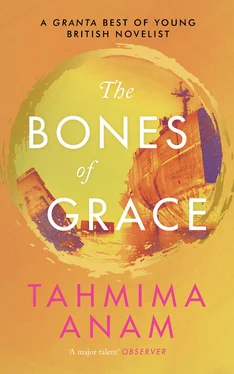‘Call your father.’
‘My father’s dead.’
‘Everything you said was lying?’ Says it like his feelings are hurt, the bastard.
‘At least I’m not a thief.’
‘It wasn’t my idea.’
I turn my face away. ‘Fuck off.’ And he goes.
He nags and nags. Holds up his mobile and says, ‘Call someone, get the money. They’re going to move you to the blocks; then I won’t be able to get you out.’
A few days later and the fire on my chest is starting to fade. It still hurts but mostly when I try to sit up, or cough. I start to think about getting out of here, and when Shumon comes I take the phone and dial the only number I know. Shathi picks up on the first ring.
‘Wife,’ I say, ‘I’m in trouble.’
‘Are you alive?’
Before I can tell her what a stupid question that is, I feel a swell of grateful that she would ask this, as if she didn’t care about a single other thing.
‘Ya,’ I say, quiet like.
‘Sobhan Allah.’
‘I need money.’
‘How much?’
‘Two.’
‘Where are you?’
‘Shumon,’ I say, ‘where am I?’
He tells me. I tell her.
‘I’ll send your brother.’
‘There isn’t two in the trunk. Where will you get the rest?’
I hear her breathe on the other side of the phone, little cat breaths. ‘Don’t worry, I will get it.’
‘I gave money to the mosque. Get it back, talk to the imam.’
‘Okay.’
I hang up and I start to cry. Like a baby. Like a girl. A girl baby. A suckling goat.
Guard gives me a bucket of water. I pour it over my legs, rubbing my feet together. Even on the cement floor, I can see the water runs black from my body. I’m disgusted by my own dirt, the smell that’s coming off my body. My fingernails are long; I chew them; I tear off the extra, scraping my fingers against the rough walls to smooth out the ragged. I go behind my ears, the back of my neck.
Then I sit on the edge of the cot. I wait. Dal and rice come so I know it’s lunchtime. Sun sets. My brother’s not coming. I tilt myself back onto the cot, killed by another day.
I wake up to the door opening. Shumon. I don’t even lift my head.
‘You’re out,’ he says.
‘Not going anywhere with you.’
He hovers over me, little scarry lip pressed right up on my face. ‘Your money came.’
‘Where’s my brother?’
‘He’s not here.’
I can’t be sure if this is another trick. I could even be dreaming the whole thing. Or I’m dead and stuck between earth and hell and this is what they make me do, see if I’m still as stupid as I was when I breathed.
Shumon gives me clean clothes. I recognise the shirt, the lungi. ‘Where did you get those?’
‘Your wife. She’s waiting outside.’
I follow him out the door, through the corridor. Nobody stops us, no one even asks, we just stroll through like we’re ghosts. Maybe I am dead. But then I see Shathi and she’s holding a bag with both hands, so when I go up and hug her she just stands there like a stone.
Shumon gives me something. It’s my mobile phone. I snatch it from his hand and walk away as fast as my beaten legs will let me, Shathi beside me, and we don’t turn around to see what happens to him, we just keep walking like we have somewhere to go.
Shathi has a cousin who has a friend who owns a sweetshop on Halishar Road. We can stay with him tonight, and tomorrow we’ll take the bus home. Wife and I don’t say anything to each other. She hails a rickshaw and helps me climb in. She takes a packet out of her bag and passes it to me. She holds me steady over the bumps in the road and I eat, remembering the village.
We get to the sweetshop and the cousin’s friend takes us upstairs, to the room he’s got above the shop. His wife is as unsmiling as he is. She asks about Shathi’s father. She gives us each a chom-chom. It’s so sweet I’m gagging for a glass of water. She pours me one in a tin cup. All I want to do is lie down but there’s no bed for us — we’ll sleep downstairs, once the shop is closed.
Shathi opens her bag and takes out an eggplant, a handful of tomatoes and a pumpkin. The wife seems pleased now with her vegetables from the village. Then she tells me I should take Shathi around the city, show her the sights, which is her way of saying bugger off till after dark, I’m not feeding you.
We cross the road and Shathi bargains for a guava with the fruit-seller. We sit on the edge of the pavement with our feet hanging over the drain, passing the guava back and forth. ‘My chest hurts,’ I tell her. ‘Pain,’ I say. ‘Pain, pain.’
Someone comes and shoos us away. This is his place — he’s going to set up his chotpoti stall. We start to walk. I take the phone out of my pocket. ‘I’ll get something for this,’ I say. ‘Maybe a thousand.’
‘Okay.’
‘Where did you get the money? Did you go back to the mosque like I told you? Did the Mollah give you the money back?’
‘He spent it already.’
‘Bastard.’
‘Mosque will have a new roof, everyone will think of you.’
‘What I left you wasn’t enough, where d’you get the rest?’
‘The bull. I sold it.’
‘That much?’
‘It was a big animal.’
I’m thinking about all the times she hauled herself out of bed in the morning to cut hay for that bull. And I had complained about it, saying it made her stink too much of the village, and why couldn’t we smell different, like city people, now that we had some money?
‘What did my mother say?’
‘She was crying about the fridge, and the TV.’
Shit. Of course the bull wasn’t enough. ‘Let’s go to Patenga,’ I say.
People are sitting on the big rocks and eating things and looking out into the sea. I look too and see a couple of ships far out. Shathi lays out the end of her sari and sits down. I’m noticing how everything she does she does slowly, like she means to. No accidents with her. She pulls her knees up to her chest and like that, all squashed together, she’s even more like a doll.
‘Tell me what we’re gonna do when we get home,’ I say.
‘We’ll plant mustard.’
‘And?’
‘There’s the vegetables to pick.’
‘Tell me the vegetables.’
‘Eggplant, gourd, cauliflower. Beans. Spinach.’
‘What else will happen?’
‘Nothing. It will go on like before.’
I’m thinking of before, what it was like when I didn’t have any money, when I hadn’t gone to foreign. I’m thinking of my mother’s face, and how many times a day she’s gonna tell me I screwed my life up. It’s all playing out in front of me, I’m pissed off every time I wake up by that stupid mosque with its new roof and shiny paint, and whoever has bought my TV, I’m hearing that too, across the compound, when I’m trying to sleep, and the voice in my head telling me I should never have taken that money in the first place, no, not without thinking of Pahari and his family.
‘I can’t go home,’ I say.
She get up and starts walking towards the water, skipping over the rocks. I go after her.
‘It’s not what you think.’
She stops, looks at me. ‘I’ve never asked you for anything.’
True. She had never even said my name. ‘I can’t go home,’ I say. Ask me something else. ‘You want to stay here with me?’
‘Someone has to look after your mother.’
It’s starting to get dark and the crowd is thick now, the light the colour of stones.
‘I want a child.’ She looks at me again and I’m getting that she has thought about this. And that what she’s really saying is that she wants more than a kid, that she wants to be a wife, a real wife. I wonder if I can give her this. My dream of Megna will have to go. I’ll have to kick her out like I did the first time; then again, I’ve shed blood for her. That should matter, should open the door a crack for the rest of my life. For Shathi. I reach over and hold my wife’s hand and we smell the waves, and the ocean smell reminds me of that water that fell from me when I bathed, only yesterday. We walk away from the sea and past the people, laying out their picnics, scolding their children, cracking open boiled eggs.
Читать дальше












